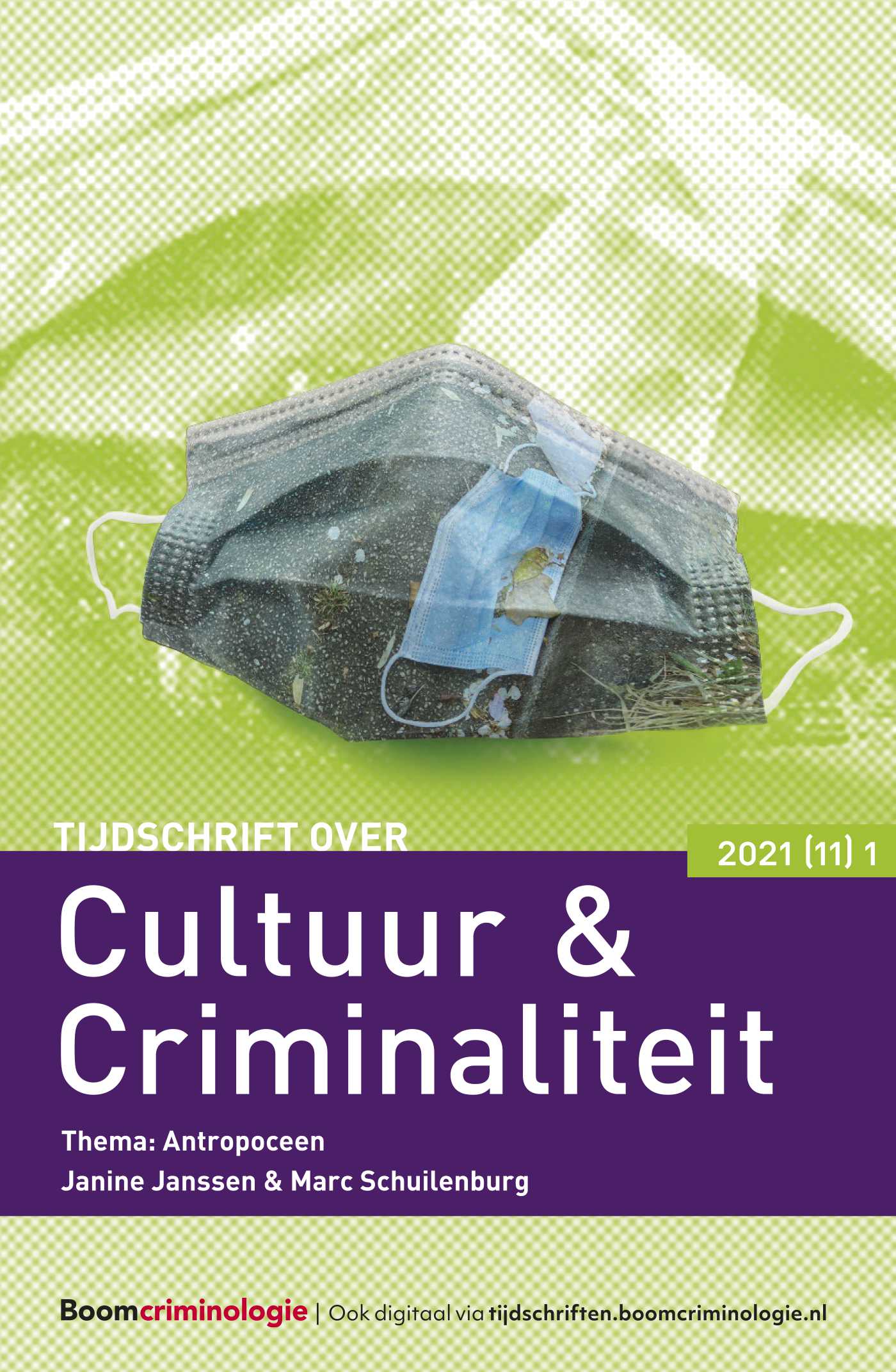|
As a result of stricter regulations and critical views on the position of researchers, field studies are being conducted less frequently. Keeping distance seems a safe standard, but data collected at close range is valuable for cultural criminologists who investigate people of flesh and blood in real life – the contributions in this theme issue report on ethnographic or biographical research. The authors' extensive reflections paint a realistic picture of their one-to-one relationships with the protagonists of their research. |


Tijdschrift over Cultuur & Criminaliteit
Over dit tijdschriftMeld u zich hier aan voor de attendering op dit tijdschrift zodat u direct een mail ontvangt als er een nieuw digitaal nummer is verschenen en u de artikelen online kunt lezen.
| Artikel |
|
| Trefwoorden | afstand of dichtbij, een-op-eenrelatie, reflecteren, positie onderzoeker, informed consent |
| Auteurs | Frank van Gemert en Hans Nelen |
| SamenvattingAuteursinformatie |
| Artikel |
Geef cakeOver wederkerigheid en resocialisatie in een tbs-traject |
| Trefwoorden | biografie, kroniek, wederkerig, resocialisatie, tbs |
| Auteurs | Frank van Gemert |
| SamenvattingAuteursinformatie |
|
After collaborating with the author, Jan, the protagonist of a biography, commits a life crime. A 3.5-year sentence is followed by a more extended stay in a secure forensic unit (tbs). These settings are different. Jan is familiar with detention, and it is easy for him to move in this masculine world. However, in the forensic unit, he struggles as many adjustments are required. Over a period of 13 years, the relationship between Jan and the author changes. It reaches an equilibrium as gifts reciprocate, and this is a reflection of Jan’s process of resocialization. |
| Artikel |
Skypen met een koopman des doodsOver de morele ambiguïteit van een wapenhandelaar en van zijn biograaf |
| Trefwoorden | wapenhandel, biografie, moraliteit, ambiguïteit, criminologie |
| Auteurs | Yarin Eski |
| SamenvattingAuteursinformatie |
|
The movie Lord of War led to many discussions between Constantine – the biographee of my criminological biography of an arms dealer (Eski, 2022) – and myself. While the movie portrays arms dealer as devoid of morality, exploiting war and human suffering for personal gain (Niccol, 2005), Constantine’s biography paints a different picture. Through engagement with him, condemned as a ‘merchant of death,’ I discovered a man who construes and maintains his moral compass, navigating ambiguity by shifting principles and roles. This article delves into the challenges faced by a biographer in understanding the essence of the biographee’s life, particularly when grappling with moral complexity. |
| Artikel |
‘Stoppen met die straatgame’Longitudinale etnografie (N=1) van het proces van desistance |
| Trefwoorden | desistance, longitudinale etnografie, fenomenologie, straatkapitaal, identiteitsverandering |
| Auteurs | Robby Roks |
| SamenvattingAuteursinformatie |
|
This article centers on the process of (gang) desistance of Jermaine, a man with a substantial criminal record who has been part of the Dutch Crips gang for over a decade. From a phenomenological perspective, drawing on 15 years of longitudinal ethnographic research, Jermaine’s process of desistance is described, with specific attention for his first steps in leaving gang and street life behind, his search for regular work, and the transformation of his (gang) identity. This life story illustrates how much desistance should be understood as a struggle, accompanied by periods of relapsing into old patterns of (criminal) behavior. In addition to these more practical challenges in terms of act-desistance (Nugent and Schinkel, 2016), Jermaine’s story showcases the importance of identity in the process of desistance. Above all, Jermaine’s story indicates that for some, desistance means that the old criminal or gang identity does not need to be casted aside, but that it become part of the new identity of the desister. |
| Essay |
De studente en de straatratOver de omgang tussen een onervaren onderzoeker en een doorgewinterde protagonist |
| Trefwoorden | Criminology, Positionality, Reflexivity, Interviewing |
| Auteurs | Joyce van Dommelen |
| SamenvattingAuteursinformatie |
|
Reflection of an inexperienced researcher who wrote a criminological biography by working with a hardened protagonist. The positionality of researcher and protagonist is used to examine how they built trust and understanding, and to explain which difficulties they faced during the process. The most challenging aspect of their collaboration was dealing with the traumatic nature of the protagonist’s life story, which brought up anger and sadness and caused the protagonist to become reluctant to hold the interviews. Dealing with these issues required a reflexive process and flexibility regarding the approach to the interviews. |
| Significant others |
Shadd MarunaCriminologie van de persoonlijke verhalen |
| Auteurs | Frank van Gemert en Hans Nelen |
| Auteursinformatie |
| Voorbij de horizon |
Hoe dicht kom je bij een beer? – Antropologische reflecties op een bijzondere ontmoetingBespreking van: Nastassja Martin, Geloven in het Wild (vert. Peter Bergsma), Amsterdam: Koppernik 2022 (eerder verschenen als Croire aux Fauves, Paris: Galimard 2019) |
| Auteurs | Hans Nelen |
| Auteursinformatie |
| Doka |
De hand van Jan |

